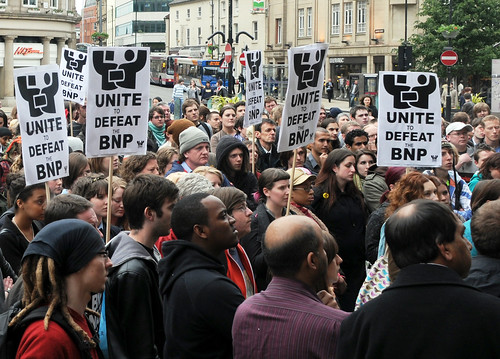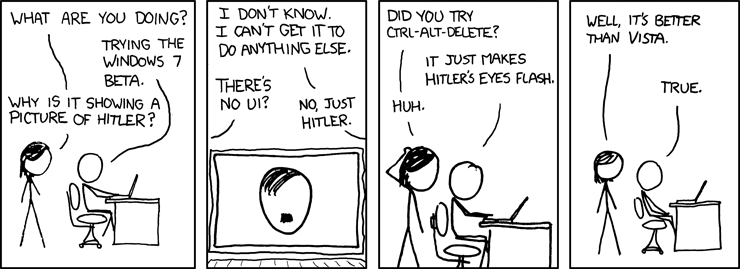Well, it's that time of year again when we
blog against disablism. It's such a massive topic that it is very difficult to know what to say, what to write about.
I want to talk about disablism within healthcare. It is a huge subject, and there are many issues, and I can't cover them all in this one post.
I will begin with the very funny, and worryingly apt,
Code of Ethical Behaviour for PatientsDO NOT EXPECT YOUR DOCTOR TO SHARE YOUR DISCOMFORT
Involvement with the patient's suffering might cause him to lose valuable scientific objectivity.
BE CHEERFUL AT ALL TIMES
Your doctor leads a busy and trying life and requires all the gentleness and reassurance he can get.
TRY TO SUFFER FROM THE DISEASE FOR WHICH YOU ARE BEING TREATED
Remember that your doctor has a professional reputation to uphold.
DO NOT COMPLAIN IF THE TREATMENT FAILS TO BRING RELIEF
You must believe that your doctor has achieved a deep insight into the true nature of your illness, which transcends any mere permanent disability you may have experienced.
NEVER ASK YOUR DOCTOR TO EXPLAIN WHAT HE IS DOING OR WHY HE IS DOING IT
It is presumptuous to assume that such profound matters could be explained in terms that you would understand.
SUBMIT TO NOVEL EXPERIMENTAL TREATMENT READILY
Though the surgery may not benefit you directly, the resulting research paper will surely be of widespread interest.
PAY YOUR MEDICAL BILLS PROMPTLY AND WILLINGLY
You should consider it a privilege to contribute, however modestly, to the well-being of physicians and other humanitarians.
DO NOT SUFFER FROM AILMENTS THAT YOU CANNOT AFFORD
It is sheer arrogance to contract illnesses that are beyond your means.
NEVER REVEAL ANY OF THE SHORTCOMINGS THAT HAVE COME TO LIGHT IN THE COURSE OF TREATMENT BY YOUR DOCTOR
The patient-doctor relationship is a privileged one, and you have a sacred duty to protect him from exposure.
NEVER DIE WHILE IN YOUR DOCTOR'S PRESENCE OR UNDER HIS DIRECT CARE
This will only cause him needless inconvenience and embarrassment.
The reality is that many disabled people receive inadequate medical care. People with mental health problems can have huge problems getting physical problems to be taken seriously. People with physical impairments can find that any other symptoms or illnesses they have are dismissed. People with multiple impairments can be written off as hypochondriacs.
Perhaps doctors consider that if you are already in pain with one problem, then additional, unconnected pain is not that important. Certainly, many doctors feel that if you experience madness then surely a physical symptom is all in the mind. I've lost count of the number of times that I have been told that something treatable I'm experiencing will *not* be treated, 'because you already take a lot of tablets'. When I vomited every day for 10 months, I was never sent for tests because it was 'bound to be anxiety'. Medication side-effects are not taken seriously - serious though they may well be.
The result is that disabled people suffer more than we need to. Health is neglected, and further problems result. We may not be straight-forward patients, we may cause the doctor to need to work a bit harder, but that's not an unreasonable expectation, surely. It is their job.
Being listened to, being taken seriously, being treated well, are all things which everyone should be entitled to, and which everyone should receive.
In the news recently was harrowing accounts of neglect of learning disabled people who were supposed to be receiving healthcare:
There was a man,
Martin Ryan, who starved to death after not being fed for 26 days while in hospital.
Five other people's care was also slammed.
The
British Medical Journal states that:
One year after its damning report into the delivery of health care to disabled people, the Disability Rights Commission, the statutory watchdog organisation for people with disabilities in England, Wales, and Scotland, says in a new report that little has changed to bridge the gap in health care.
The
Disability Rights Commission report:
An investigation into healthcare given to people with mental health problems and learning disabilities shows they often get worse treatment than others.
The Disability Rights Commission (DRC) - which examined eight million health records - says the government could face legal action unless things change.
The study concentrated on primary care in England and Wales, which will soon fall under new equality laws.
The government says it has already started acting on the report.
The 18-month investigation shows that people with learning disabilities and mental health problems are more likely to have a major illness, to develop a serious health condition younger and to die sooner than the rest of the population.
Such people were less likely to have routine tests and screening to pick up signs of a problem in its early stages.
'Lazy fatalism'
The DRC also found that people with learning disabilities and mental health problems face "real barriers" when accessing services.
"The acid test of a national health service is not whether it works for those who are generally healthy, but whether it benefits those with the greatest risk," said DRC chairman, Bert Massie.
He said that the response from the government and the NHS was "deeply inadequate", a situation which was made worse by "a dangerously complacent attitude and a lazy fatalism" on the part of the medical profession.
"This is completely unacceptable - we need to see a radical change in the commissioning, targeting and delivery of health services in order to close this gap quickly."
The British Medical Association (BMA) has described the findings as "extremely worrying".
"As doctors, we believe it is unacceptable for the healthcare needs of this group of people to be ignored," said Dr Sam Everington, who co-chairs the BMA's equal opportunities committee.
He said the report would be discussed by GPs at the BMA in the near future.
The Department of Health said it would be working with the DRC to develop a full response to the investigation.
Mental health charity Sane said it was "disturbing" that people with mental illnesses were at greatest risk of becoming physically ill through neglect.
The charity's Marjorie Wallace called for a "new drive amongst all health professionals to ensure that each time a person with mental illness receives medical help, they are given a physical health check".
Eight million records
The investigation spoke to senior health professionals, policy makers and disabled people themselves.
Researchers analysed eight million health records in three primary care trusts (PCTs) in England and one local health board in Wales.
The DRC says that in spite of increased needs of these two groups, important checks are provided less often.
For example, people with learning disabilities who have diabetes have fewer measurements of their body mass index, while those who have had a stroke have fewer blood pressure checks.
The investigation identified a problem known as "diagnostic overshadowing" - where symptoms of physical ill health are often seen as part of a patient's mental health problem or learning disability and are not properly investigated or treated.
More than 50% of people who spoke to researchers said they experienced difficulties when trying to see their GP.
They identified the attitude of reception staff, inflexible appointments and inaccessible information as being some of the causes.
A few said they were not registered with a family doctor or had been struck off the list for being too demanding.
The report did identify areas of good practice but the DRC says services are frequently working in isolation and initiatives developed by specialists have not become part of the mainstream.
The government is being urged to put in place a number of improvements to "close the gap".
"We agree with the broad thrust of the DRC's recommendations and have already started to act," said health minister Rosie Winterton.
She said £7m had been made available to almost 90 PCTs to employ "wellbeing nurses" to help mental health patients.
The department has also allocated £42m to PCTs to help them to implement further measures to improve the care of people with learning disabilities.
This is not theoretical, this is actually happening, and I witness or experience it myself, all too often.
If disabled people are to ever have equal access to society, we need equal access to good healthcare.
Please see also my other
Blogging Against Disablism Day post, over on my
photography blog, where you can see various empowering disability rights designs I have created.















